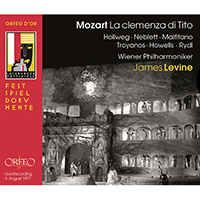Tatiana Troyanos
Troyanos’s parents were both keen amateur singers, her mother (who hailed from Stuttgart) in particular encouraging her daughter’s interest in music. She herself however identified most closely with the family on her father’s side (he was Greek, and worked in the restaurant business), always characterizing herself as Greek-American. Her parents separated when she was young and she was brought up initially by Greek relatives, living in a tenement in the area on which Lincoln Center now stands, before entering the Brooklyn Home for Children when she was seven or eight.
Here Troyanos began to study the piano with Louis Pietrini, first bassoon of the Metropolitan Opera Orchestra, who arranged a scholarship for her at the Brooklyn School of Music, where she also sang as well as involving herself in all aspects of performance. In her late teens she moved to Manhattan and would go the Met as a standee, particularly admiring Risë Stevens, and also began to explore the recorded legacy of Maria Callas. After completing high school and taking a secretarial course she became secretary to the publicity director at the publishers Random House. Here, since she was already active in amateur choirs, she was encouraged to pursue her singing studies. Troyanos now entered the Juilliard School, becoming a student of Hans Heinz, a major life influence, and concentrating on oratorio and concert singing rather than opera. She was selected as a soloist for performances of Verdi’s Requiem and Bach’s St John Passion and also found herself in the chorus of the original production of The Sound of Music.
In 1963 Troyanos joined the New York City Opera, making her professional solo debut as Hippolyta / A Midsummer Night’s Dream, followed by Marina / Boris Godunov and several other roles. Her idol Risë Stevens, who had heard her sing excerpts from Carmen in concert, arranged an audition with Rudolf Bing, who offered her a contract for small parts at the Metropolitan Opera. This Troyanos refused and, encouraged by Heinz, left in 1964 for Europe where she auditioned for the Frankfurt, Hamburg and Zürich opera companies. Rolf Liebermann, then intendant at Hamburg, offered her a contract, which she eventually accepted: Hamburg was to be her base for the next ten years.
In an early indication of her extraordinary versatility, Troyanos made her Hamburg debut as Preziosilla / La forza del destino. Other initial roles included Lola / Cavalleria rusticana and Suzuki / Madama Butterfly before she moved on to more substantial repertory, including the title role in Carmen, Cherubino / Le nozze di Figaro, Marina, Dorabella / Così fan tutti and Octavian / Der Rosenkavalier. She also sang in several important world premieres at Hamburg, notably creating the role of Jeanne in Penderecki’s The Devils of Loudun in 1969, and appeared with the company when it performed in New York in 1967, singing Baba the Turk / The Rake’s Progress.
Internationally, Troyanos’s breakthrough came in 1966 when she sang the Composer / Ariadne auf Naxos opposite Régine Crespin at the Aix-en-Provence Festival. The following year she sang Cherubino as a substitute at the Paris Opera when Herbert von Karajan was in the audience and he engaged her to sing with himself and the Berlin Philharmonic Orchestra. She made her debut at the Royal Opera House, London in 1968 as Octavian opposite Lisa della Casa, returning to sing Carmen in 1970 and 1974 and Romeo / I Capuleti e i Montecchi in 1985. She first appeared at the Salzburg Festival in 1969 as Octavian and returned as Sesto / La clemenza di Tito (1976–1977, 1979, 1991), Jocasta / Oedipus Rex (1982) and Dorabella (1990). Another significant debut took place in 1977 when she sang Adalgisa / Norma opposite Montserrat Caballé at La Scala, Milan.
In 1971, by which time Troyanos was singing throughout Europe, she returned to the USA to sing the title role in Handel’s Ariodante in Washington opposite Beverly Sills. This was followed by Charlotte / Werther (Chicago, 1971), Dido / Dido and Aeneas (Dallas, 1972), the Bellini Romeo (Boston, 1975) and Poppea / L’incoronazione di Poppea (San Francisco, 1975). In 1976 she made her Metropolitan Opera debut as Octavian, closely followed by the Composer, remaining a major figure in Met casts until her early death from breast cancer in 1993. During this period Troyanos extended her repertoire considerably: her roles included Adalgisa, Amneris / Aida, Brangäne / Tristan und Isolde, Carmen, Charlotte, Countess Eboli / Don Carlo, Countess Geschwitz / Lulu, Dido / Les Troyens, Dorabella, Fricka / Das Rheingold, Giulietta / Les Contes d’ Hoffman, Hänsel / Hänsel und Gretel, Kundry / Parsifal, Orlowsky / Die Fledermaus, Santuzza / Cavalleria rusticana, Sesto, Venus / Tannhäuser, Waltraute / Götterdämmerung and the title role in Handel’s Giulio Cesare. In 1992 she created the part of Queen Isabella in Philip Glass’s The Voyager and her final appearance, only a month before her death, was as Clairon / Capriccio with the San Francisco Opera.
An actress of great versatility, Troyanos possessed a rich mezzo voice and her singing was notable for great depth of expression. Physically tall, she excelled in trouser roles, in which her intensity of delivery frequently translated into a sense of yearning, another key aspect of her singing. In addition to her operatic work, she recorded extensively and was an accomplished performer in concert and recital.
© Naxos Rights International Ltd. — David Patmore (A–Z of Singers, Naxos 8.558097-100).

















